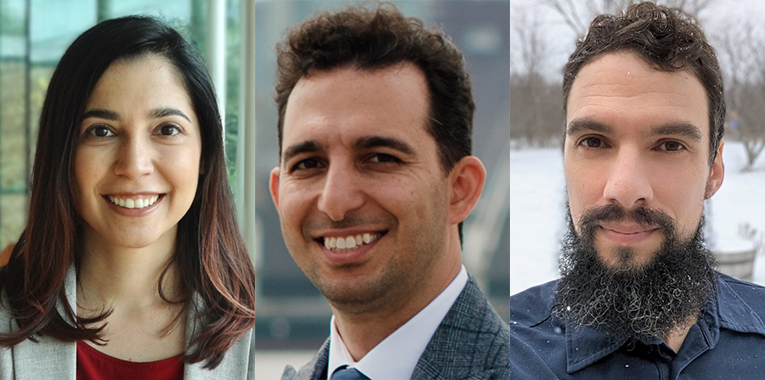
A group of physics students is working to shed more light on the topic of dark matter in collaboration with their York professors and colleagues in Germany, thanks to the EXPeriential Learning Opportunity through Research and Exchange program (EXPLORE), an endeavour that provides undergraduate students with hands-on experience in scientific research.
By Elaine Smith
EXPLORE, which is funded by York’s Academic Innovation Fund (AIF) and Germany’s DFG Collaborative Research Center CRC-TR 211, came into being as the result of conversations between Laura Sagunksi, a former postdoctoral Fellow from York who is now a professor at Goethe University in Frankfurt, and four other professors at York University and Goethe University. The York physics and astronomy professors involved in the program are Nassim Bozorgnia, Saeed Rastgoo and Sean Tulin. The group created the program to bridge the gap between learning science in a classroom and working as a researcher, allowing students to experience for themselves what it might be like to have a research career.

“Learning physics in the classroom is very different from working in a research group,” Bozorgnia said. “EXPLORE is very valuable because it’s an opportunity for students to experience a real research group environment, working with both local and international colleagues. It really mimics an actual research group and offers an international exchange – albeit a virtual one during COVID-19.”
The program kicked off in the 2021 Summer term with 17 students – seven from York, nine from Goethe and one from the University of Toronto – and five supervising professors. Each professor mentored two to four students directly.
Interested York students were asked to apply to the program. “We received a good number of applications, but we had to select students based on the number of German students involved, as well as the number of professors,” Bozorgnia said. Those chosen from York were given paid work-study opportunities; in Germany, the students registered for the program as a course.
The professors chose dark matter as the topic of study “because it’s an area that connects all the professors and it’s an exciting theme,” said Bozorgnia. “It is an open problem in particle physics and cosmology and provides options for cutting-edge research.”
Elham Rahimi, a graduating physics major at York, participated in EXPLORE, working under Bozorgnia's supervision, along with a pair of students from Goethe.
“I loved every minute of EXPLORE. I learned a lot about dark matter, my coding skills improved, and got the chance to work with amazing people,” Rahimi said. “I'm so excited to continue my EXPLORE research with Professor Bozorgnia and to understand more about the distribution of dark matter in our solar neighbourhood.”
Once she got involved with research and “could apply my knowledge and skills to understand more about dark matter, it motivated me to work harder. I could see spending my career this way,” Rahimi added.
Feedback from other EXPLORE participants was equally enthusiastic, so Bozorgnia and her colleagues decided to offer the program again during the 2022 Winter term. Rather than a work-study opportunity, it will be classified as an independent research course. There will be two separate projects overseen by integrated (Canada-Germany) teams of professors. Ideally, if the pandemic is not a factor, the York students will also travel to Germany during reading week to work side-by-side with their Goethe counterparts.
“It was a very exciting opportunity and actual research came out of it,” said Bozorgnia. “We are currently publishing papers based on research results and the professors have all contributed to an article for Educational Physics about the experience.
“We are open to other professors joining us in this endeavour; if more faculty members take part, we can increase the number of students involved. We’re open to expanding the reach to biophysics and other fields, too. It’s a perfect vehicle for students who want to consider careers in academia or industry,” Bozorgnia said. “When they really understand what research is, it helps them make an informed decision.”
To learn more, see this PDF of an overview presentation about EXPLORE.
